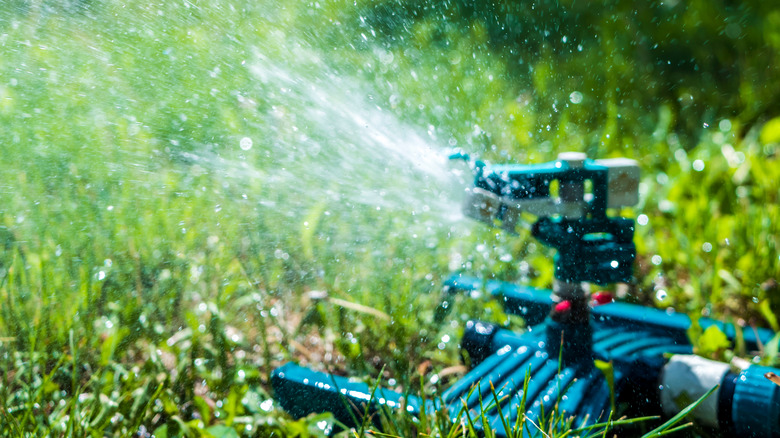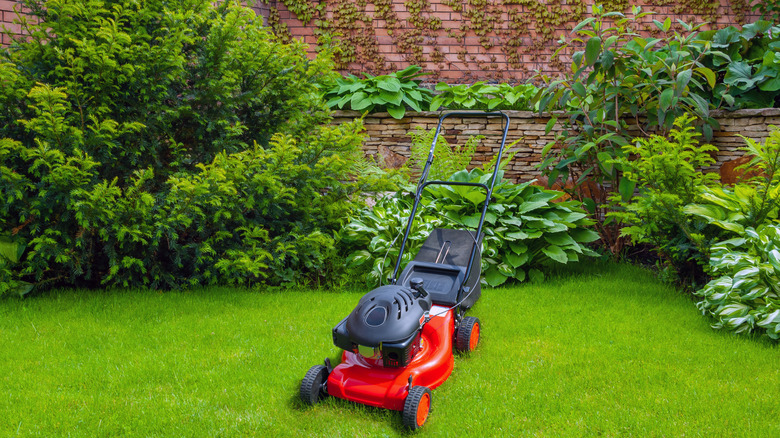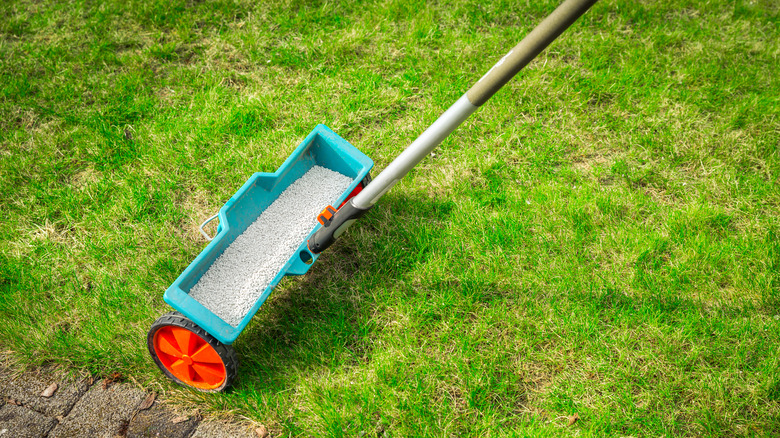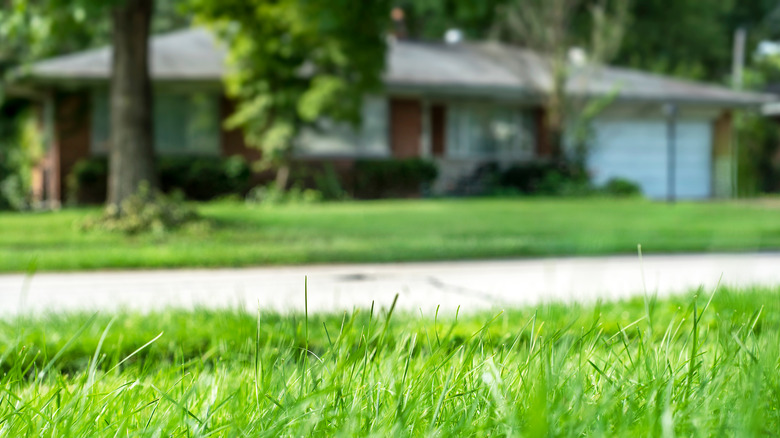5 Lawn Care Myths You Need To Stop Believing
The biggest obstacle standing between you and the lawn of your dreams is thinking that you're not up to the task. What's far more likely is that the ways you've been coaxing your lawn to live its best life include a variety of methods that have proven over time to not work so well.
Many of the folks who grew up before the internet knew two things about lawn care: One, if you don't water your grass, it's going to die. And two, if you don't cut your grass, your home will look like squatters are living under your roof. These days, there's a lot of free expert advice about what makes grass grow, what obstacles your yard has to overcome, and how and when to offer a gentle assist to have your lawn become the showpiece of the neighborhood.
Here's what we do know for sure: your ability to grow a great lawn — anywhere you have access to sufficient water — has nothing to do with your green thumb or lack thereof. Instead, it has everything to do with consistency and a willingness to reassess old habits that die hard.
Unfortunately, you may be making many mistakes along the way, from not having a proper watering schedule to the way you fertilize and cut your grass. The good news is that every one of your mistakes starts with a myth that's been dispelled by scientists and professionals.
1. Lawn care doesn't require planning
Think of bringing your lawn to its full potential as a campaign in the sense that your commitment will be ongoing. If that seems like a slog, well ... you're right. But like your pets or other members of your family, we all have to eat and experience some level of care in order to thrive. So it's better to think of your yard as a living thing, rather than part of a static still-life photograph. Once you've begun to internalize that idea, you're ready to step up your gardening game.
Many of us believe that planning ahead is unnecessary when it comes to our lawn's care and maintenance. To change this, you must first assess your yard and then create a systematic plan to ensure how it will thrive rather than survive. According to the lawn care professionals at Stauffer's of Kissel Hill, you'll want to establish what they call a baseline. That means you should take a thorough inventory. Note any bald spots and weeds like crabgrass, as well as the state of the soil.
Almanac describes this process as the best way to understand the health (and pH balance) of your lawn. You'll learn the texture of your yard, including its nutrients, and that will in turn let you know where it's deficient, which is the only way to be certain about what kind of fertilizer you'll need. From here, you can make a plan for your lawn's care moving forward.
2. You can water at any time
Your lawn is not a camel, and it doesn't have gills, either. However, like most living things, your yard requires hydration on a schedule. But the second myth you may believe is that watering at any time should be sufficient. That may keep some of your lawn alive, but it's a far cry from optimal.
The experts at Hi Tech Irrigation explain that yards do best when watered less frequently but more deeply than novices might expect. If you're a homeowner with a below-ground sprinkler system in place, they estimate that this translates to three times a week of watering at 30 minutes per dousing. (They also provide a method so that you can identify how much water your sprinklers are actually putting out; without that, the estimate is useless guesswork.)
Some people think that watering during the hottest part of the day or daily prevents grass from scorching or drying out. That's a myth, too. Lawns don't need water every day, and if you water in the afternoon, most of that is going right up into the air as it evaporates. Lawns are resilient, too. So if you're in a drought-stricken area where water is being conserved, fret not: your yard will bounce back once temperatures drop and water becomes more available.
And finally, if your grass doesn't respond to water after a period of deprivation, you might have a different problem. Check your yard for such parasites as grubs and fungus (via Lawn Mower Guru).
3. Cutting the grass shorter is better
The next lawn care myth is that cutting your grass shorter than recommended will save you from having to mow more often. Not so, say the professionals at Custom Lawn & Landscaping Inc. When you cut your grass too short, what you're actually doing is removing a protective layer of vegetation and possibly exposing roots to excessive sun exposure. And that's an express pass to having the brownest yard on your block. You're also inadvertently making it easier for weeds, which are more hearty and heat-resistant than grass, to invade and take over your yard.
There's also an age-old myth that keeping clippings on your grass is bad for your lawn. That's wrong as well, says Custom Lawn & Landscaping Inc. Instead, those clippings — mostly comprised of water — should be mulched and returned to the yard because they assist in distributing and preserving the nutrients your lawn needs.
Lehigh Landscaping dispels another myth that the sharpness of your mower blades has little to no effect on the overall health of your lawn. Keeping your blades sharp makes certain that there's a clean break between what you've cut and what remains growing in the ground. Dull blades tend to rip at your grass and do damage at the cellular level. As a result, each blade of grass reacts by going brown at the tip as if cauterizing a wound.
4. Fertilizer is a one-size-fits-all product
You may believe that fertilizer is food for plants and have been applying it indiscriminately as a result. This is a myth, say the professionals at Joshua Tree Experts. Through photosynthesis, plants actually make their own food, and fertilizer is a combination of chemical supplements that assist in getting your grass to maximum health.
It's also untrue that fertilizer will fill in bald spots in your yard. The pest and lawn experts at Solutions Stores tell us that fertilizing ground that isn't properly seeded is going to just waste fertilizer. They also point out that the term grass is itself a generic reference to a lot of different grasses. Because they're not all the same, not all grasses should be treated identically. St. Augustine Grass, for example, succeeds well in warmer and more humid climates because it's acclimated to grow in shade and close to the ocean. It follows logically then that your lawn will respond best to fertilizers that are engineered specifically for your grass and the environment in which you live.
If you're looking to learn which lawn fertilizers would be best for you and your yard, Lawn Starter has a substantial list of products, featuring their conclusions about the pros and cons of each. Some are more general-purpose and others are created to address specific seasons. Because the quality of your soil can be as much a variable as the kind of grass you're growing, there really is no one generic fertilizer.
5. Professional help isn't necessary
The last myth you may believe is that you can outdo qualified professionals because lawn care isn't rocket science. That's not to say you can't have grand success as a grower of grass, and the steward of the finest lawn in your neighborhood. But if you're having trouble reaching the goals you've set for yourself, there are experts waiting in the wings who have worked with the same problems over decades. Certainly, you should take whatever time you feel is right to get there on your own, but there are tells that you're going to need intervention for your yard to reach its full verdant potential.
Mower Place has a guide to let you know when it's time to bring in the heavy artillery. The signs that something is amiss can range from an abundance of pests to the prospect that you're better at raising weeds than grass on your home turf. A professional can look at grass that's constantly wet to identify problems with standing water or drainage to patchy and bare spots that won't seem to fill in, no matter what.
Ultimately, say the pros at The Big Green K, time is still money and you really don't want to spend many of your evenings and weekends trying to diagnose and correct a problem that would be more quickly solved with an expert on the case.





